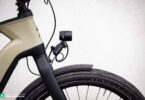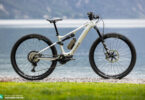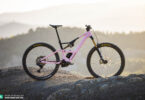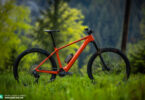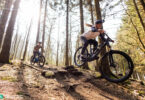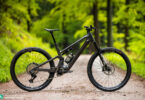The Lab: The Evil Eye Traileye ng in review – Mountain bike eyewear with prescription glasses
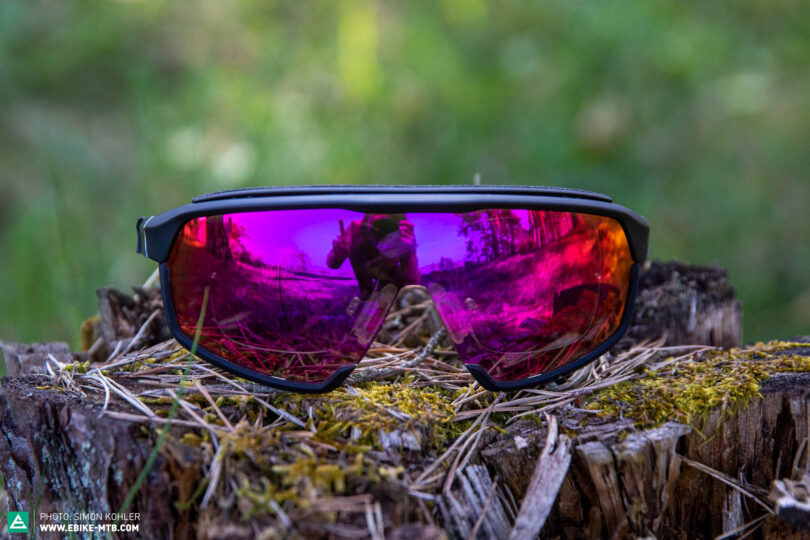
Mountain bike eyewear is an essential piece of trail riding kit, protecting your eyes from dirt, dust, and UV light. But what if you need prescription lenses? Is there a solution for mountain bikers that functions as both corrective eyewear and sunglasses? We tested the Traileye ng from Evil Eye to find out if they can do just that.
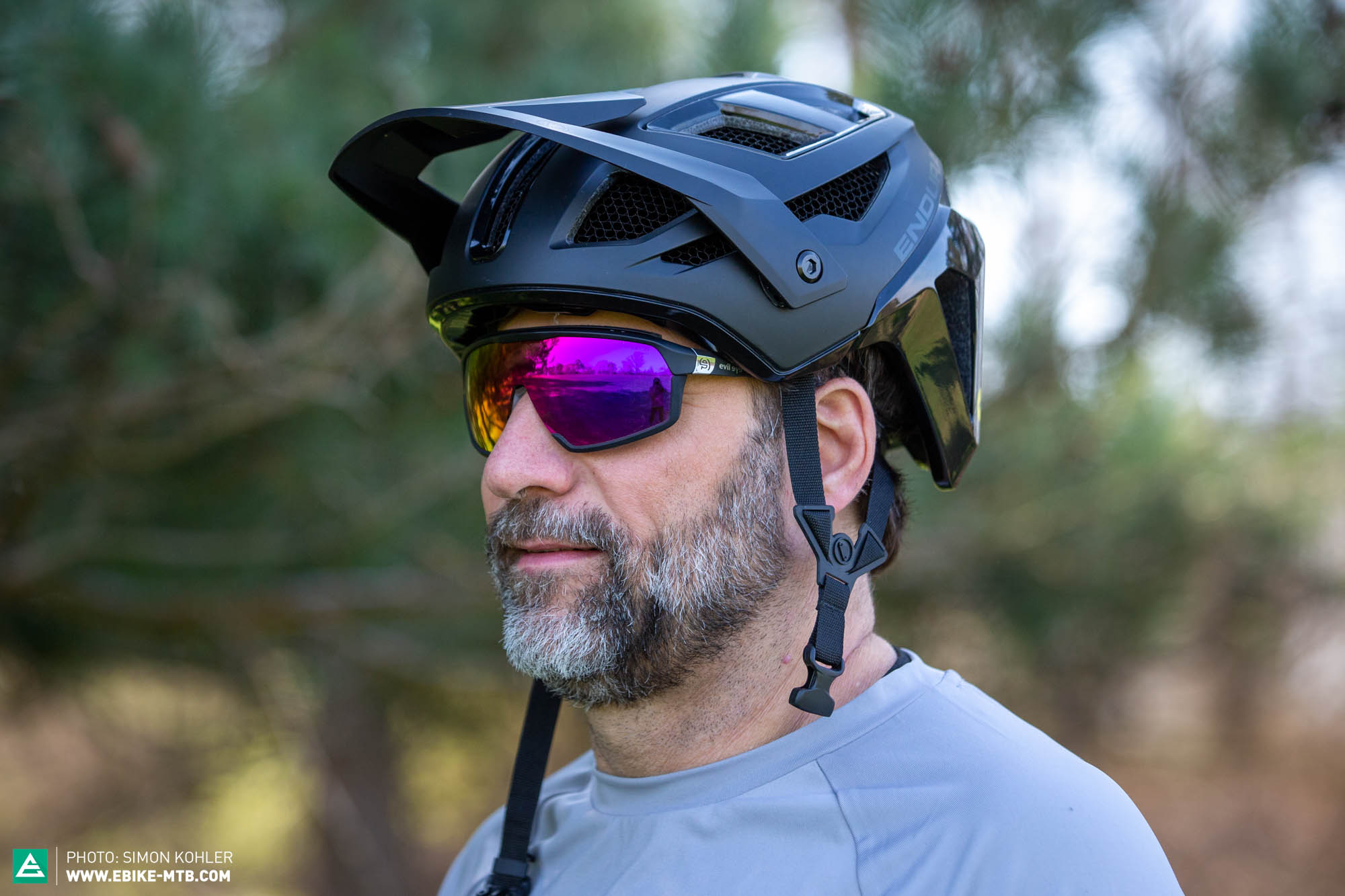
The Silhouette group is out to offer high-quality eyewear for sports people with the Evil Eye brand. We put the Traileye ng model to the test and got extensive advice from an optician in advance. Basically, you can choose between two corrective lens options: adapter glazing or a clip-in solution.
Adapter glazing
With this option, two corrective lenses are incorporated into the main one-piece lens. Since the inset corrective lenses are relatively small in diameter, they can have quite high dioptres of correction, i.e. a high curvature without the lens becoming overly thick. As such, you get one continuous, smooth surface, almost like direct glazing. One of the disadvantages is that the colour of the lens might not match perfectly with the corrective lenses. That way you can see the corrective lenses, which could bother you if you’re very style conscious. The price for this variant is between € 580 and € 790 (progressive lenses), including the frame, adapter lens, and corrective lenses.
Clip-in
With this option, the optical lenses clip in behind the main one-piece lens individually. The advantage is that you can use the clip-in lenses with different Evil Eye models, including ones designed for mountaineering, and road cycling, etc. The disadvantage is that the corrective lenses sit rather close to your eyes, and your eyelashes might touch them when you blink, which some might find annoying. You also need to clean 2 more lenses. Another advantage of the clip-in version is that no one can see if you’re using corrective lenses, at least if the outer lens of the Traileye ng is mirrored. The model on test set us back by € 834, including progressive prescription lenses that clip in.
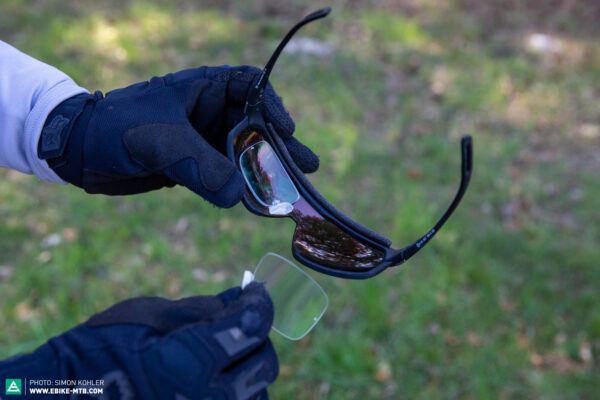
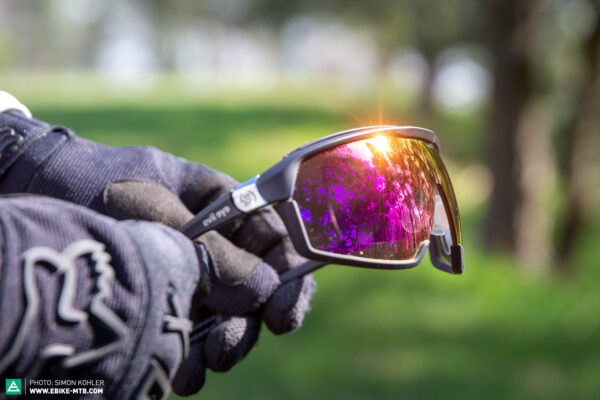
Both options have specific advantages and disadvantages. Since eyewear with prescription lenses can get quite expensive, it’s worth consulting a specialist. It turns out that the adapter solution doesn’t work for everyone, including our tester, although the corrective lenses are smaller and therefore allow for more extreme curvatures: despite having the right curvature, the lenses still wouldn’t give him a sharp image. This can be due to a variety of complex physiological and mechanical reasons. Ultimately, we learned from this experience that the visual effect of curved lenses differs from person to person. As we mentioned above, you’ll want to consult an optician to make sure you get the suitable correction for your eyes.
Fit and handling
The temples of the Traileye ng can snap into three different positions, allowing them to be adapted to the unique shape and posture of your head. There’s a ribbed rubber coating incorporated into the temple tips, which helps keep them in place. The adjustable double-snap nose bridge can accommodate various nose sizes. A removable forehead pad promises to absorb sweat before it runs into your eyes. The glasses can be combined with different lens technologies. We tested the LST Bright Vario Purple Mirror combination. LST stands for Light Stabilizing Technology and was developed by Silhouette, claimed to enhance contrasts and harmonise fast changes in light, as you’d encounter when riding into and out of woods. Vario is what Evil Eye call their self-tinting lenses, allowing them to adapt smoothly to the light conditions. Purple is the lens colour, and Mirror describes the mirror effect. Almost all the parts of the glasses are detachable, which means you can reorder individual components if anything breaks.
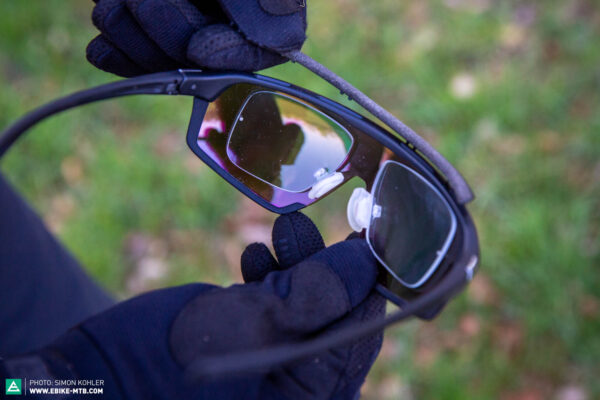
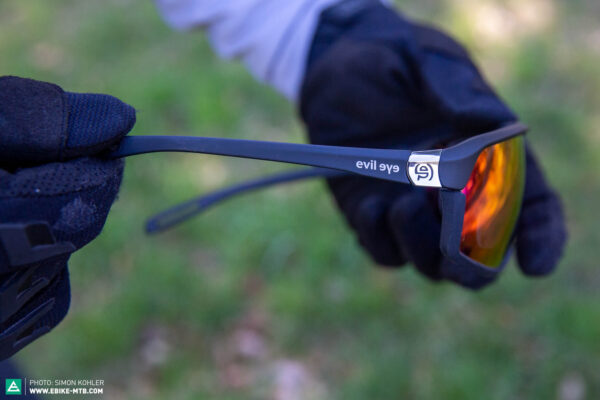
Our test impression of the MTB eyewear with prescription lenses
The lens of the Traileye ng provides plenty of contrast, clarity and almost unbelievable sharpness. Thanks to the Vario technology, the glasses adjust to different brightness levels and absorb light by up to 62%. Even if things get a little dark, you can still see clearly, although the lens always filters out at least 13% of the light. It’s only on night rides, when it’s pitch black, that we would recommend swapping the lens out for a clear model – available online for € 53 – which is quick and easy to do thanks to the clip in technology. If you tend to ride trails with changing light conditions, you’ll want to consider whether the self-tinting lens makes sense.
All Evil Eye models are made of extremely robust PPX material, making them ultra-light and non-slip, so the glasses stay securely on your head even on rough trails. The wind blows in your face, but not your eyes, and thanks to the dynamic ventilation system, the glasses remain super comfortable to wear, nonetheless. Special ventilation ports in the frame ensure that excess moisture is dissipated, and the lenses don’t fog up.
It’s an expensive piece of eyewear, but the Evil Eye Traileye ng is highly adaptable and offers a high-quality solution for all trail riders with prescription lenses, providing optical correction, including a progressive option, UV and wind protection, adjustable temples, and good ventilation. However, it’s essential to consult your optician, because each eye is different, and the lenses must be adapted accordingly. In return, you get eyewear that provides a clear view of every trail.
Tops
- high-contrast vision
- available with prescription lenses, including a progressive, multifocal option
- self-tinting in bright light
- prescription lenses of the clip-in variant aren’t visible from the outside
Flops
- hefty price point
- there is limited space between the clip-in prescription lenses and your eyes, so they can touch your eyelashes
Did you enjoy this article? If so, we would be stoked if you decide to support us with a monthly contribution. By becoming a supporter of E-MOUNTAINBIKE, you will help secure a sustainable future for high-quality cycling journalism. Click here to learn more.
Words: Susanne Feddersen Photos: Simon Kohler



